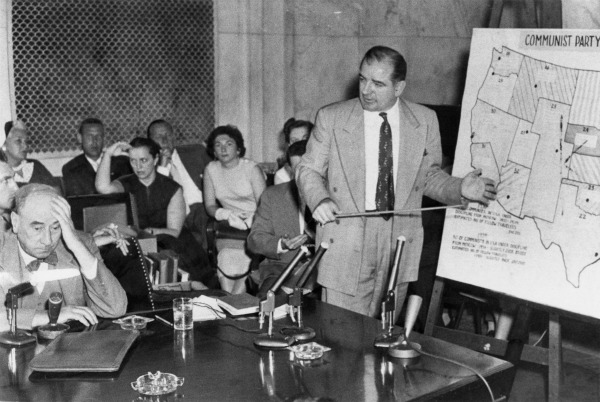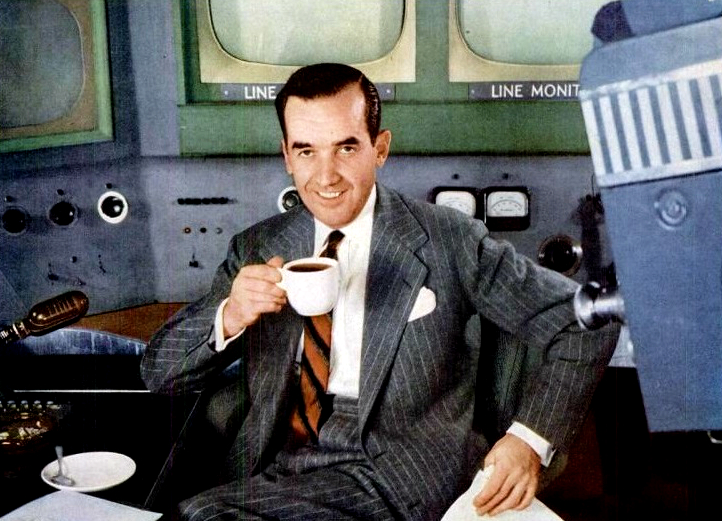How the Media Should Cover Donald Trump If They Want to Avoid Disaster
By:
In 1954 Edward R. Murrow devoted an episode of his CBS show "See it Now" to Senator Joe McCarthy. Murrow criticized the senator for stepping over the line from investigating to persecuting, adding “this is no time for men who oppose Senator McCarthy’s methods to keep silent.”
 By United States Senate [Public domain], via Wikimedia Commons - wikimedia.org
By United States Senate [Public domain], via Wikimedia Commons - wikimedia.org
McCarthy later defending himself against Murrow’s “vicious attacks,” by accusing the journalist of having been “engaged in propaganda for communist causes.” Attack the attacker. Seems eerily familiar.
 By Copyright 1953, Pan American Coffee Bureau (Life magazine, page 59) [Public domain], via Wikimedia Commons - wikimedia.org
By Copyright 1953, Pan American Coffee Bureau (Life magazine, page 59) [Public domain], via Wikimedia Commons - wikimedia.org
While, at that time, Murrow was in a unique position as a respected television journalist, those days are over. In an era of decentralized news, there’s no one person who can focus national attention. The big three networks (ABC, NBC, CBS) are no longer the big three, having been supplanted by Fox, CNN, and MSNBC.
Fox? They’ve firmly established themselves as the Republican Ministry of Information. Yet, at times, even their commentators seem nonplussed when trying to justify the comments of the Republican presidential nominee. CNN has surrendered some legitimacy by relying on visual gimmickry, along with hiring some dubious on-air personalities.
And while MSNBC has been the most consistent in calling Trump out, during the early primaries they would occasionally air his rallies without comment, effectively turning the channel into MSNBC-SPAN. Not that they were alone in handing Trump a reported $2 billion in free airtime. All too many new shows began with a field reporter standing in a crowded arena, pointing to the podium, saying “the candidate will be out any minute.” This is a job for a boxing ring announcer, not a journalist.
Trump blitzkrieged his way through the primaries, vanquishing his opponents with low rent cracks, blatant lies, and assaults against anyone who seemed to poke his insecurities, but he has since crossed the line from nominee to demagogue, dragging the electoral process into the inferno of his own twisted psyche.
This over-the-line behavior begs the question: What is the responsibility of news shows that cover him?
After Trump’s Gold Star family feud and plummeting, post-convention poll numbers, the news cycle featured a letter signed by 50 Republican defense experts stating that Trump was unfit to be commander in chief. On most shows the topic of discussion was the power, as well as the political fallout of the letter. Yet, on CNN, Corey Lewandowski, Trump’s Haldeman-esque former campaign manager, now network commentator jumped into damage control mode by discrediting those who signed it. Attack the attacker. How is this news?
Later, as the candidate prepared to deliver an economic address in Detroit, the theme on several news shows was: Can Trump reboot? Can he change his rhetoric? Can he pivot to the general election by staying on message? This “pivot” idea still floats around like it’s a real thing. The chatter is not only about whether Trump can “stay on script,” but whether he looks comfortable doing it. Another commentator stated that Trump could make up some lost ground as long as he doesn’t get distracted or riled by protestors. After the speech, two MSNBC hosts conclude that he accomplished his goal, declaring it an optical success.
Not that actual journalism didn’t eventually break out. Covering Trump’s speech that night, Lawrence O’Donnell called out the candidate’s policies as standard fare supply side economics featuring tax cuts, yet oddly coupled with vast domestic spending, the result of which would be massive deficits. Then, in conversation with actual economic experts, he slowly and methodically deconstructed the proposals and debunked the lies in Trump’s speech, specifically one about repealing the “death tax.” The broadcast also included O’Donnell’s remark that Trump is “the most abjectly ignorant person who has ever run for President in the United States of America.” Analysis and the larger truth can co-exist.
So, what is the role of journalists in covering a candidate like Trump who isn’t bound either by truth or decency?
First off, you don’t parrot topics like optics, rebooting, and staying on message as a way of shoveling coal into the news cycle furnace. Not when the larger issues are so overwhelming.
As much as I admire Chris Matthews’ experience and passion, you don’t open a show with, “Is Donald Trump out of the ditch and back on the pitch?” No rhymes. That should be a hard and fast rule. When the fate of the world hangs in the balance — no rhymes.
You don’t get lost in the horse race metaphor. While technically still a race, this isn’t one where the appropriate discussion is whether one of the horses can “get back on track.” This is a race where one horse has vaulted over the rail into the stands, stomped on spectators, jumped into the luxury box, molested several women and took a dump on the bar.
You don’t hire former campaign managers as commentators when they obviously still function as apologists for their former boss.
You don’t invite spokespersons on shows to Trumpsplain their candidate’s comments by dragging his uninformed, irresponsible, and even dangerous comments into a reality distortion field, claiming that he didn’t say what he obviously said, and didn’t mean what he obviously meant. This perverts a news show into the Monty Python Dead Parrot Sketch.
When a phenomenon like Trump has a theoretical 50-50 shot at getting his hands on the nuclear button, journalism needs to up its game.
In early 2016, The Huffington Post began running the following disclaimer with their Trump coverage: "Note to our readers: Donald Trump is a serial liar, rampant xenophobe, racist, misogynist, birther and bully who had repeated pledged to ban all Muslims – 1.6. billion members of an entire religion – from entering the U.S."
This isn’t surrendering objectivity, it’s re-claiming journalistic responsibility. A Trump highlight reel from the last five years, and specifically the last 14 months, should make it painfully obvious that the candidate has gone far beyond the scope of logic, reason, and decency, especially when the climax of the reel is his most recent passive/aggressive crack, in which he mused that those upset with a Clinton victory could explore a Second Amendment remedy. And still, the Trumpsplainers were all over the news. But why give them voice? Journalists are only bound by the behavior of the phenomenon they’re covering. The more extreme a phenomenon, the less its coverage should be restrained by impartiality.
This same point was made in an article in the New York Times by media writer Jim Rutenberg, in which he wrote: “... Journalism shouldn’t measure itself against any one campaign’s definition of fairness. It is the responsibility of journalists to be true to the readers and viewers, and true to the facts, in a way that will stand up to history’s judgment. To do anything less would be untenable.”
One could also look to Barry Goldwater’s acceptance speech at the 1964 Republican convention, in which he said that moderation in the pursuit of justice is no virtue. Substitute the word “truth” for “justice” and it still applies.
Ian Gurvitz is the author of "Welcome to Dumbfuckistan: The Dumbed-Down, Disinformed, Dysfunctional, Disunited States of America."
